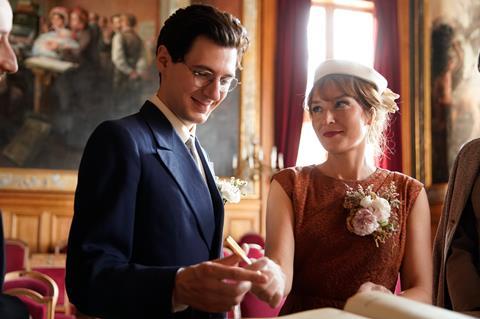An epic post-war romance starring Anaïs Demoustier and Vincent Lacoste has its roots in director Katell Quillevere’s own family history

Dir/scr: Katell Quillévéré. France, Belgium. 2023. 123 mins.
A sweeping melodrama, beginning in the aftermath of the Second World War and unfolding over two decades, Katell Quillévéré’s follow-up to Heal The Living examines a mutually advantageous marriage of convenience that, against the odds, grows into real love. This is a solid, watchable drama that, while perhaps lacking some of the directorial flair of Heal The Living, evocatively tallies the costs of living on the wrong side of social and sexual conventions in the 1950s and 60s.
A Sirkian tale of guilt and unsuccessfully repressed desires, that takes in homosexuality, race and polyamory
The inspiration for the story came from Quillévéré’s own family background. She belatedly discovered that her grandmother had conceived a child with a German soldier and had guarded this secret throughout her life. From this jumping-off point, Quillévéré weaves a Sirkian tale of guilt and unsuccessfully repressed desires that takes in homosexuality, race and polyamory, and leaves an unfortunate neglected child on the sidelines as his parents chase pleasure. It’s full-blooded, sexy stuff that, thanks to the saleable combination of Demoustier and Lacoste in the lead roles, should connect with audiences in France and perhaps elsewhere.
One of Quillévéré’s most effective decisions is to open the film with black and white archive material of the liberation of France, swiftly followed by harrowing footage showing the humiliation and punishment of women who were deemed to be Nazi collaborators or “Bosch sluts”. This cuts to Madeleine (Anaïs Demoustier), the single mother of a child conceived after a fling with a German officer, who has fled the shame and disgrace in her home village and started a new life in a resort town on the coast of Normandy. Head freshly shaved, Madeleine is trying to scrub off the swastika that has been daubed on her pregnant stomach. It’s perhaps no surprise that she finds it hard to love her infant son.
The switch from black and white to colour, and the saturated, slightly exaggerated palette of a vintage postcard, comes when the main story commences and Madeleine meets wealthy, somewhat directionless student François (Vincent Lacoste) in 1947. He’s unlike anyone she has met. He studies archaeology at the Sorbonne and, when he slips her a covert glass of champagne at the hotel where she waitresses, he toasts in ancient Greek. She is open about her past; he is less so.
Their wedding day is only slightly marred when Madeleine’s son Daniel runs away; “I forbid you to ruin my happiness,” snarls Madeleine at the boy. But it’s a figure from François’s past – a love-sick young man – who initially disrupts their married life. In a pattern that repeats itself, Madeleine and François flee the past (his past in this case) and start again as the proprietors of a rowdy jazz club catering to American G.I.s.
It’s here that they meet African American serviceman Jimmy (Morgan Bailey), who unlocks desire in both husband and wife, and inadvertently provides the key to a successful marriage for both. The score shifts from demure piano to louche, slutty trumpet-based jazz; the club takes on the aspect of a pantomime fetish bar. And by-the-by, poor ignored Daniel (played at different ages by Hélios Karyo, Josse Capet and Paul Beaurepaire) is joined by a little sister.
A lot of ground is covered, but little attempt is made to age either actor, apart from progressively more matronly haircuts for Demoustier and a touch of grey around the temples for Lacoste. But when you have a pair of performers as delicately expressive as they are, not to mention an actress as luminously pretty as Demoustier, you can understand the reluctance to cake them in prosthetic wrinkles. And in a way, the idealised, ever-youthful representation of the characters makes sense: both Madeleine and François have spent a lifetime hiding their true selves, after all.
Production companies: Les Films Du Bélier, Les Films Pelleas, Frakas Productions
International sales: Charades, leonard@charades.eu
Producers: Justin Taurand, David Thion, Philippe Martin
Screenplay: Katell Quillévéré, Gilles Taurand
Cinematography: Tom Harari
Editing: Jean-Baptiste Morin
Production design: Florian Sanson
Music: Amine Bouhafa
Main cast: Anaïs Demoustier, Vincent Lacoste, Morgan Bailey, Hélios Karyo, Josse Capet, Paul Beaurepaire, Margot Ringard Oldra















![[L-R]: Amanda Villavieja, Laia Casanovas, Yasmina Praderas](https://d1nslcd7m2225b.cloudfront.net/Pictures/274x183/6/4/1/1471641_pxl_20251224_103354743_618426_crop.jpg)








